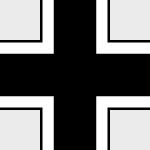Dragon DRR60572 German Neubaufahrzeug Heavy Tank - Nr. 2, Versuchsfahrzeuge, Germany, 1935 (1:72 Scale)
"If the tank succeeds, then victory follows."
- Major-General Heinz Guderian, "Achtung Panzer!"
 The German Neubaufahrzeug series of tank prototypes were a first attempt to create a heavy tank for the Wehrmacht after Adolf Hitler had come to power. Multi-turreted, heavy and slow, they did not fit in with the Blitzkrieg tactics and therefore only five were made. These were primarily used for propaganda purposes, though three took part in the Battle of Norway in 1940.
The German Neubaufahrzeug series of tank prototypes were a first attempt to create a heavy tank for the Wehrmacht after Adolf Hitler had come to power. Multi-turreted, heavy and slow, they did not fit in with the Blitzkrieg tactics and therefore only five were made. These were primarily used for propaganda purposes, though three took part in the Battle of Norway in 1940.
During the 1920's and 1930's, a number of countries experimented with very large, multi-turreted tanks. The British built a single example of the Vickers A1E1 Independent in 1926. This inspired the Soviet T-35, which was built in limited numbers from 1933.
Development of the Neubaufahrzeug (German for "new construction vehicle") started in 1933 when the then Reichswehr gave a contract for the development of a Grotraktor (heavy tractor) to both Rheinmetall and Krupp. Grosstractor was a codename for the development of a heavy tank, Germany being still forbidden to develop tanks under the terms of the Treaty of Versailles.
The two designs resembled each other to a great extent, the main difference being the weapons placement. Each had a main turret armed with a 75 mm KwK L/24 main gun and secondary 37 mm KwK L/45. Rheinmetall's design mounted the second gun above the 75 mm KwK L/24, while the Krupp design had it mounted next to the 75 mm KwK L/24. Both designs had a secondary turret mounted to the front and the rear of the main turret. These turrets were slightly adapted Panzer I turrets, with the standard machinegun armament.
Rheinmetall's design was designated the PzKpfw NbFz V ('PanzerKampfwagen NeubauFahrzeug V'), and the Krupp design the PzKpfw NbFz VI. It was intended that these designs would fulfill the role of heavy tank in the armored forces, but the design proved to be too complex and unreliable for this role. Development nevertheless continued in order for the nascent German military to gain experience with multi-turreted tanks.
In 1934 Rheinmetall built two mild steel prototypes, both with their own turret design. Three more prototypes were built with proper armor and the Krupp turret in 1935 and 1936.
Dragon Armor is offering a 1/72 scale model of the second Neubau-Fahrzeug prototype. This Neubau-Fahrzeug Nr.2 is impressive in its rare camouflage colors of green, brown and sand, perhaps a portent of the schemes that would later appear during WWII. As a prototype, the model does not bear any tactical markings, although it was used at a training school until 1940. The turrets are precisely replicated, and they are notably different to those mounted on the three production tanks. This was one monster of a tank, and now modelers can own one bedecked in eye-catching colors!
Sold Out!
Dimensions:
Length: 4-1/2-inches
Width: 2-1/4-inches
Release Date: June 2012
Historical Account:"Now, People Rise Up, and Let the Storm Break Loose!" - Though Neubaufahrzeug heavy tanks were never placed in production, they provided a propaganda tool for Nazi Germany, for example being shown at the International Automobile Exposition in Berlin in 1939.
This propaganda role was extended with the German invasion of Norway, when a special Panzerabteilung was formed which took the three armored prototypes with them to Oslo. They saw some combat there, with one being blown up by German engineers when it got stuck in swamps near Ndalsnes. To replace it, one of the mild steel prototypes was used.
It is unclear what happened to the tanks after the Norway campaign, but none of them survived the war. The surviving vehicles were ordered scrapped in 1941, which took place in 1942 according to documents captured by the British in 1945. The dates upon which the vehicles were scrapped are unclear, but it is thought that the beginning of the construction of the Sturer Emil prototypes dates from the same time.
All that survives of these tanks is a small number of Running gear parts, preserved in the Gudbrandsdal Krigsminnesamling (Gudbrandsdal War Memorial collection), at Kvam in Norway.


